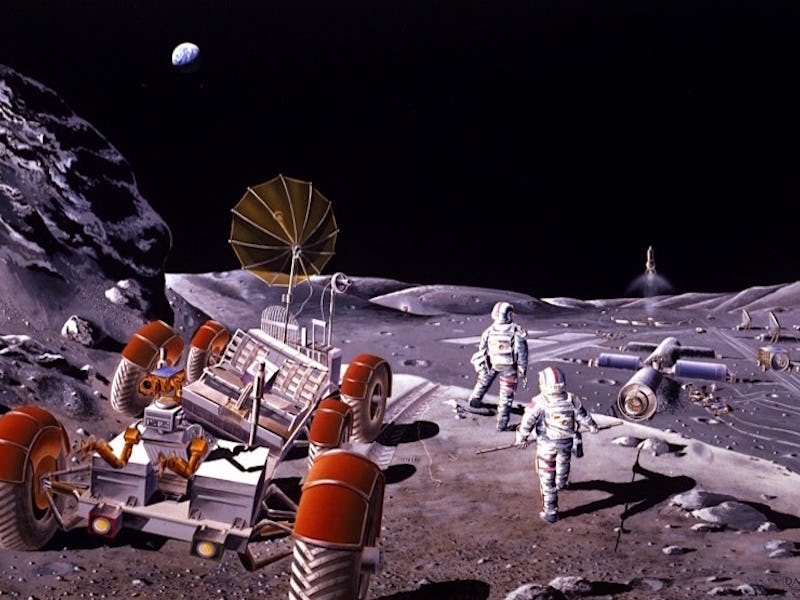Luxembourg's Asteroid Mining is Legal Says Space Law Expert
Tiny Luxemburg could mine space rocks bigger than itself.

The great orbs of rock and metal floating through outer space cannot be owned by any person or nation, yet on Tuesday, a law passed by the Luxembourg parliament earlier this month went into effect, making asteroid mining legal.
The law might seem like a violation of the 50-year-old Outer Space Treaty, which prohibits space ownership, yet the mining of celestial bodies is legal — for now, anyway.
The Luxembourg law creates a governing body to supervise the harvesting of these asteroids and serves as a critical component of the nation’s greater ambitions in outer space mining, called its Space Resources Initiative. The initiative’s stated mission is to “Contribute to the peaceful exploration and sustainable utilization of space resources for the benefit of humankind,” and so far includes a $230 million dollar fund to entice companies to set up space mining businesses in Luxembourg.
With the creation of cheaper rockets, the private space industry — led in large part by SpaceX’s reusable rockets — is regularly blasting into space, opening up moons, asteroids, and planets to almost certain exploration and prospecting. Luxembourg’s new law will give companies that operate out of Luxembourg ownership of the resources extracted from resource-rich asteroids, while not claiming sovereignty or ownership of any such massive space rock itself.
But this interpretation of the Article two of the Outer Space Treaty, drafted in 1967 and now ratified by nearly every county in the world, is not without precedent. The United States legalized asteroid mining in 2015 with the U.S. Commercial Space Launch Competitiveness Act. By then, two U.S. Companies, Deep Space Industries and Planetary Resources, developed plans to go into space and prospect asteroids for valuable minerals.
“The U.S. was confronted by the need to do something and took the step to allow for the ownership of minerals. It gave them a kind of guarantee that they could go there, harvest minerals, and make money,” Frans von der Dunk, a space law expert at the University of Nebraska-Lincoln, told Inverse.
Private companies will first sample asteroids before investing in expensive ventures to mine the valuable metals and resources therein.
Luxembourg and the United States are not doing anything illegal, as long as they aren’t sticking a flag into an asteroid and declaring ownership. “In terms of the law, yes it’s true that no country can claim any part of outer space as national territory — but that doesn’t mean private industry can’t mine resources,” says von der Dunk.
This mining legality, however, could be short-lived. Not every nation is keen on Luxembourg’s “free-market” designs upon the solar system’s asteroids.
“It’s legal, but we don’t know how this is going to end up,” says von der Dunk. “So we can’t say with full confidence that it’s legal because it might be illegal in some countries that oppose it.”
There are two main camps of thought, explains von der Dunk: Those that side with the U.S. and Luxembourg, and those that want to establish an international regime that regulates who can mine what in outer space. The most vocal leaders opposed to Luxembourg’s law are Russia and Brazil, explains von der Dunk, who don’t view these mining operations as meeting the non-ownership standards of the Outer Space Treaty, which states:
…outer space, including the Moon and other celestial bodies, is not subject to national appropriation by claim of sovereignty, by means of use or occupation, or by any other means
The Outer Space Treaty is vague when it comes to space mining, in part because it was composed half a century ago, before this was a realistic commercial venture. As is apparent, the vague language allows for an interpretation of the law, but von der Dunk still sees the law as doing its job. Nations are beginning to individually write laws that they think meets the criteria set forth by the Outer Space Treaty, without actually claiming any other planets or moons.
“Any private company should be pleased with the Outer Space Treaty, even though it’s not perfect. So far, so good,” says von der Dunk.
An artist's rendering of the metal Psyche asteroid. NASA plans to send a robotic mission to study the 130-mile diameter space rock in 2023, although the probe won't arrive until 2030.
In the future, space mining could become a formalized part of the law, he says, by adding a specific protocol to license mining operations, though only if the licensed miners comply with a set of requirements. What these requirements could be remains uncertain, but one can assume that the resources brought back must first be sequestered and examined to ensure that nothing harmful might be unleashed onto Earth.
Coming to an international consensus, however, is no simple task. So Luxembourg’s mining legalization might be an especially clever strategy for legally selling metals harvested from asteroids without full international consent. Although a tiny nation with a small population of half a million, it’s a member of the wealthy European Union. If Luxemburg brings back space resources, the other EU member nations are entitled to buy such goods, even if outside nations cry foul.
Luxembourg, then, may have rich buyers for its space products, even if some powerful space-faring nations, like Russia, object to its means of resource extraction.
“Luxembourg is more important than it seems at first glance,” says von der Dunk.